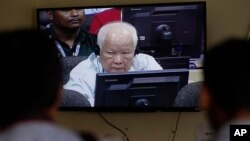A top Cambodian government official has reiterated his government's intention to end the work of the U.N.-backed tribunal that last week convicted the last two surviving leaders of the Khmer Rouge of genocide, crimes against humanity and war crimes.
Deputy Prime Minister Sar Kheng, speaking Saturday at a government ceremony in the northern province of Oddar Meanchey, said the tribunal's work had been completed and there would not be any additional prosecutions for acts that led to the deaths of an estimated 1.7 million people in the 1970s.
He cited the terms under which the tribunal, staffed jointly by Cambodian and international prosecutors and judges, had been established, limiting its targets to senior leaders of the Khmer Rouge regime that was in power from 1975 to 1979. The rules also allow prosecuting those most responsible for carrying out atrocities.
Sar Kheng's remarks were reported Sunday.
On Friday, the tribunal sentenced Nuon Chea, 92, the main Khmer Rouge ideologist and right-hand man to its late leader Pol Pot, and Khieu Samphan, 87, who served as its head of state, to life sentences. The two had already been serving life sentences on a previous conviction.
In nine years of hearings and at a cost of more than $300 million, the tribunal has convicted only one other defendant, Kaing Guek Eav, alias Duch, who as head of the Khmer Rouge prison system ran the infamous Tuol Sleng torture center in Phnom Penh.
Cases of four more suspects, middle-ranking members of the Khmer Rouge, had already been processed for prosecution but have been scuttled or stalled. Without the cooperation of the Cambodian members of the tribunal, no cases can go forward.
Long-serving Prime Minister Hun Sen has repeatedly declared there would be no more prosecutions, claiming they could cause unrest. Hun Sen himself was a mid-level commander with the Khmer Rouge before defecting while the group was still in power, and several senior members of his ruling Cambodian People's Party share similar backgrounds. He helped cement his political control by making alliances with other former Khmer Rouge commanders.
In his remarks, Sar Kheng, sought to reassure former Khmer Rouge members that they would not face prosecution.
"Because there are some former Khmer Rouge officers living in this area, I would like to clarify that there will be no more investigations taking place [gainst lower-ranking Khmer Rouge members], so you don't have to worry," said Sar Kheng, who is also interior minister.
He acknowledged that even without more prosecutions, the tribunal still had to hear the appeals expected to be lodged by Nuon Chea and Khieu Samphan, but aside from that task, its work was finished.







